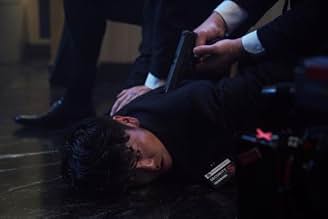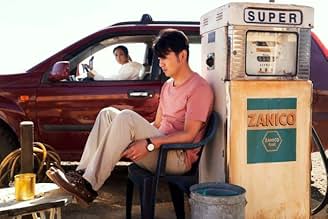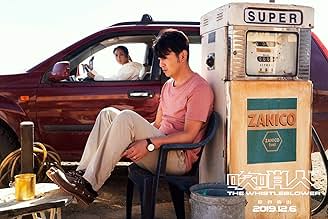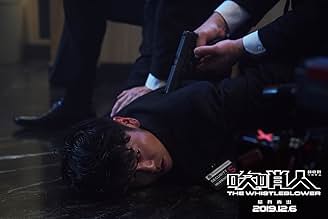IMDb-BEWERTUNG
5,2/10
338
IHRE BEWERTUNG
Füge eine Handlung in deiner Sprache hinzuFollowing a fatal accident, a Chinese expatriate working for a mining company in Australia discovers that new technology developed by the company may be a health risk, and investigates a web... Alles lesenFollowing a fatal accident, a Chinese expatriate working for a mining company in Australia discovers that new technology developed by the company may be a health risk, and investigates a web of conspiracies in his search for the truth.Following a fatal accident, a Chinese expatriate working for a mining company in Australia discovers that new technology developed by the company may be a health risk, and investigates a web of conspiracies in his search for the truth.
- Auszeichnungen
- 1 Gewinn & 1 Nominierung insgesamt
Handlung
WUSSTEST DU SCHON:
- WissenswertesThe filmmakers had originally planned to shoot scenes in Africa until location manager Pia Emery convinced them to film the African scenes in Victoria, Australia.
- PatzerThere is no such airport or terminal at Melbourne Airport called "Melbourne Executive Airport"
Ausgewählte Rezension
The introduction to The Whistleblower - featuring James Bond style opening credits, and an explosive earthquake in Africa which devastates a village - may leave you thinking you're about to watch an entirely different film. Though the movie haphazardly juggles the action and thriller genres, it also tries its hand at melodrama and comedy, with mixed results, the film having such massive tonal shifts, it almost gave me a nose bleed.
The plot follows protagonist, Mark (Lei Jiayin), a Chinese citizen with an Australian residence permit, working in the land down under for Harrison (John Batchelor) a big-shot at GPEC, an international mining giant. It might be worth noting that approximately half of the film is in English, and the other half is in Chinese (with subtitles).
When a city in China wishes to take advantage of GPEC's coal production, their representative - who also happens to be Mark's ex-girlfriend - Siliang (Tang Wei), is sent to negotiate on the local government's behalf.
Their complicated relationship history in mind, Mark and Siliang engage in a night of lurid passion ~ after which she gets on a plane and Mark goes home to his family (we are only *now* introduced to his wife, Judy (Xi Qi) and son). Before Judy discovers Mark's infidelity, Siliang's flight crashes at sea.
This shocking turn of events is made more so when Siliang contacts Mark - no, she's not a zombie - she has cheated death, and is now in hiding, suspecting mercenaries had a hand in taking down the plane. Mark's doubts are put to rest when one colleague, Peter (Ce Wang), dies under mysterious circumstances, and another GPEC staffer, Tom (Brett Cousins) goes missing in Africa. What conspiracy could be at play here? Who is behind it all? And can Mark and Siliang figure it all out in time?
Tang Wei gives an excellent performance, as usual, which ironically is a problem ~ her character is disingenuous and not particularly likable, making it hard to sympathize with her. Siliang's intellect is also questionable ~ not long into the movie, she contacts one of the antagonists after her 'death' and says (I'm paraphrasing) 'hey mate ~ I'm actually alive ~ please don't come after me'. What, dear reader, do you think happens next?
Similarly, John Batchelor is totally under-appreciated with the two-dimensional character he has been handed, which does not befit his acting prowess. I strongly recommend 2012's Red Dog to anyone who wants to see Batchelor's extraordinary range.
Moving on, by the time Judy uncovers Mark's infidelity, the film attempts to portray *him* as the victim, with Mark's son initially supporting him. The addendum that I found Judy to be the most endearing and empathetic character represents not just Xi Qi's phenomenal talent, but the film's inability to understand its audience ~ we'll come back to this problem later.
What makes the film an even harder pill to swallow is how overly complicated everything is, with so many twists and turns. I'm all for a good twist (I'm looking at you, 2002's High Crimes), but here in The Whistleblower? Character X is a villain; now they're a victim; no, they're a villain again; now they're indifferent ~ and this issue plagues more than one role.
Moreover, when the film is not being confusing, it becomes unrealistic and relies on sheer happenstance - example, when our protagonist literally finds evidence on the side of the road. Is that how investigations are supposed to work?
This is further compounded by the film's repetitive structure, which mirrors 1998's Godzilla. Exchange a giant lizard for Mark and Siliang; exchange New York for Melbourne (and parts of Africa); and exchange U. S soldiers for random mercenaries. I dare you to count the number of times the bad guys find our leads and pursue them.
I would however like to give credit to the film, in its ability to establish information early in the narrative, which then becomes important later ~ example, the initial African earthquake and Judy's profession in digital animation. If only everything in the film could have been this well executed.
Returning to the aforementioned tonal shifts, a lot of this comes down to the choice of soundtrack. Despite the film's ability to score emotional scenes, the action sequences can be more hit and miss, with the inclusion of generic, almost cartoony, slap-stick style music. The overused effects, which accompany the occasional explosion or car chase, equally hamper immersion. Being passable at best, scenes of cars robotically flipping 180 degrees into the air, are likely to make most viewers shake their heads in disbelief.
Lastly, one thought I kept returning to was, 'who is this movie made for?' Chinese audiences? A text crawl at the end of the movie reveals whistleblowing is basically illegal in China. Australian audiences? It's ironic that two major Australian film financiers produced a feature which demonizes Australia as a country willing to corrupt and hurt China. Additionally, movies produced by Australia usually self-promote the beauty of the nation's natural wonders, and with the exception of a scene at a famous landmark in the first act, so much potential is squandered, with most Australian locations appearing generic.
What about international audiences? Well, the script's attempts at English, though grammatically good, are terribly formal, clunky and robotic. People DO NOT talk like this. Additionally, when Mark's infidelity is scandalized in the national news, he and Siliang are seemingly crucified, for what would not even be considered a worthy story in Australia (and presumably in many Western countries) ~ Mark's just an average joe - a foreigner at that, and who he sleeps with shouldn't make front page news (unlike in China where losing face is so serious).
The Whistleblower, from its execution to its intended message, misses the mark (no pun intended) in so many ways. Though the finale is in some ways, satisfying, this cannot make up for an otherwise bloated, and more often than not, incoherent narrative, which blows more than it whistles.
The plot follows protagonist, Mark (Lei Jiayin), a Chinese citizen with an Australian residence permit, working in the land down under for Harrison (John Batchelor) a big-shot at GPEC, an international mining giant. It might be worth noting that approximately half of the film is in English, and the other half is in Chinese (with subtitles).
When a city in China wishes to take advantage of GPEC's coal production, their representative - who also happens to be Mark's ex-girlfriend - Siliang (Tang Wei), is sent to negotiate on the local government's behalf.
Their complicated relationship history in mind, Mark and Siliang engage in a night of lurid passion ~ after which she gets on a plane and Mark goes home to his family (we are only *now* introduced to his wife, Judy (Xi Qi) and son). Before Judy discovers Mark's infidelity, Siliang's flight crashes at sea.
This shocking turn of events is made more so when Siliang contacts Mark - no, she's not a zombie - she has cheated death, and is now in hiding, suspecting mercenaries had a hand in taking down the plane. Mark's doubts are put to rest when one colleague, Peter (Ce Wang), dies under mysterious circumstances, and another GPEC staffer, Tom (Brett Cousins) goes missing in Africa. What conspiracy could be at play here? Who is behind it all? And can Mark and Siliang figure it all out in time?
Tang Wei gives an excellent performance, as usual, which ironically is a problem ~ her character is disingenuous and not particularly likable, making it hard to sympathize with her. Siliang's intellect is also questionable ~ not long into the movie, she contacts one of the antagonists after her 'death' and says (I'm paraphrasing) 'hey mate ~ I'm actually alive ~ please don't come after me'. What, dear reader, do you think happens next?
Similarly, John Batchelor is totally under-appreciated with the two-dimensional character he has been handed, which does not befit his acting prowess. I strongly recommend 2012's Red Dog to anyone who wants to see Batchelor's extraordinary range.
Moving on, by the time Judy uncovers Mark's infidelity, the film attempts to portray *him* as the victim, with Mark's son initially supporting him. The addendum that I found Judy to be the most endearing and empathetic character represents not just Xi Qi's phenomenal talent, but the film's inability to understand its audience ~ we'll come back to this problem later.
What makes the film an even harder pill to swallow is how overly complicated everything is, with so many twists and turns. I'm all for a good twist (I'm looking at you, 2002's High Crimes), but here in The Whistleblower? Character X is a villain; now they're a victim; no, they're a villain again; now they're indifferent ~ and this issue plagues more than one role.
Moreover, when the film is not being confusing, it becomes unrealistic and relies on sheer happenstance - example, when our protagonist literally finds evidence on the side of the road. Is that how investigations are supposed to work?
This is further compounded by the film's repetitive structure, which mirrors 1998's Godzilla. Exchange a giant lizard for Mark and Siliang; exchange New York for Melbourne (and parts of Africa); and exchange U. S soldiers for random mercenaries. I dare you to count the number of times the bad guys find our leads and pursue them.
I would however like to give credit to the film, in its ability to establish information early in the narrative, which then becomes important later ~ example, the initial African earthquake and Judy's profession in digital animation. If only everything in the film could have been this well executed.
Returning to the aforementioned tonal shifts, a lot of this comes down to the choice of soundtrack. Despite the film's ability to score emotional scenes, the action sequences can be more hit and miss, with the inclusion of generic, almost cartoony, slap-stick style music. The overused effects, which accompany the occasional explosion or car chase, equally hamper immersion. Being passable at best, scenes of cars robotically flipping 180 degrees into the air, are likely to make most viewers shake their heads in disbelief.
Lastly, one thought I kept returning to was, 'who is this movie made for?' Chinese audiences? A text crawl at the end of the movie reveals whistleblowing is basically illegal in China. Australian audiences? It's ironic that two major Australian film financiers produced a feature which demonizes Australia as a country willing to corrupt and hurt China. Additionally, movies produced by Australia usually self-promote the beauty of the nation's natural wonders, and with the exception of a scene at a famous landmark in the first act, so much potential is squandered, with most Australian locations appearing generic.
What about international audiences? Well, the script's attempts at English, though grammatically good, are terribly formal, clunky and robotic. People DO NOT talk like this. Additionally, when Mark's infidelity is scandalized in the national news, he and Siliang are seemingly crucified, for what would not even be considered a worthy story in Australia (and presumably in many Western countries) ~ Mark's just an average joe - a foreigner at that, and who he sleeps with shouldn't make front page news (unlike in China where losing face is so serious).
The Whistleblower, from its execution to its intended message, misses the mark (no pun intended) in so many ways. Though the finale is in some ways, satisfying, this cannot make up for an otherwise bloated, and more often than not, incoherent narrative, which blows more than it whistles.
- totalovrdose
- 23. Aug. 2024
- Permalink
Top-Auswahl
Melde dich zum Bewerten an und greife auf die Watchlist für personalisierte Empfehlungen zu.
- How long is The Whistleblower?Powered by Alexa
Details
- Erscheinungsdatum
- Herkunftsländer
- Offizielle Standorte
- Sprachen
- Auch bekannt als
- Complot Internațional
- Drehorte
- Byron Street, Footscray, Victoria, Australien(stunt sequence in mining town in Malawi)
- Produktionsfirmen
- Weitere beteiligte Unternehmen bei IMDbPro anzeigen
Box Office
- Budget
- 50.000.000 AU$ (geschätzt)
- Bruttoertrag in den USA und Kanada
- 280.851 $
- Eröffnungswochenende in den USA und in Kanada
- 150.481 $
- 8. Dez. 2019
- Weltweiter Bruttoertrag
- 7.505.141 $
- Laufzeit2 Stunden 14 Minuten
- Farbe
- Seitenverhältnis
- 2.39 : 1
Zu dieser Seite beitragen
Bearbeitung vorschlagen oder fehlenden Inhalt hinzufügen
































